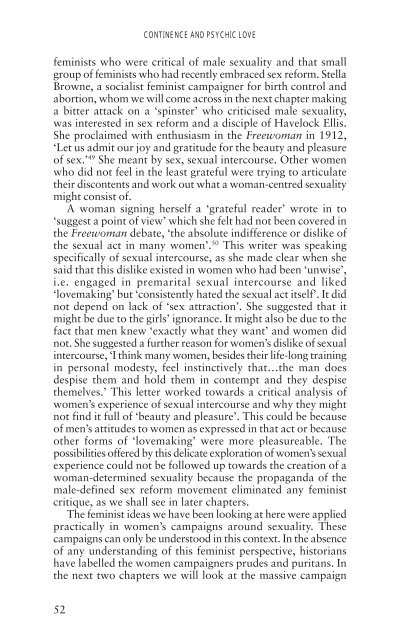The Spinster and Her Enemies - Feminish
The Spinster and Her Enemies - Feminish
The Spinster and Her Enemies - Feminish
Create successful ePaper yourself
Turn your PDF publications into a flip-book with our unique Google optimized e-Paper software.
CONTINENCE AND PSYCHIC LOVE<br />
feminists who were critical of male sexuality <strong>and</strong> that small<br />
group of feminists who had recently embraced sex reform. Stella<br />
Browne, a socialist feminist campaigner for birth control <strong>and</strong><br />
abortion, whom we will come across in the next chapter making<br />
a bitter attack on a ‘spinster’ who criticised male sexuality,<br />
was interested in sex reform <strong>and</strong> a disciple of Havelock Ellis.<br />
She proclaimed with enthusiasm in the Freewoman in 1912,<br />
‘Let us admit our joy <strong>and</strong> gratitude for the beauty <strong>and</strong> pleasure<br />
of sex.’ 49 She meant by sex, sexual intercourse. Other women<br />
who did not feel in the least grateful were trying to articulate<br />
their discontents <strong>and</strong> work out what a woman-centred sexuality<br />
might consist of.<br />
A woman signing herself a ‘grateful reader’ wrote in to<br />
‘suggest a point of view’ which she felt had not been covered in<br />
the Freewoman debate, ‘the absolute indifference or dislike of<br />
the sexual act in many women’. 50 This writer was speaking<br />
specifically of sexual intercourse, as she made clear when she<br />
said that this dislike existed in women who had been ‘unwise’,<br />
i.e. engaged in premarital sexual intercourse <strong>and</strong> liked<br />
‘lovemaking’ but ‘consistently hated the sexual act itself’. It did<br />
not depend on lack of ‘sex attraction’. She suggested that it<br />
might be due to the girls’ ignorance. It might also be due to the<br />
fact that men knew ‘exactly what they want’ <strong>and</strong> women did<br />
not. She suggested a further reason for women’s dislike of sexual<br />
intercourse, ‘I think many women, besides their life-long training<br />
in personal modesty, feel instinctively that…the man does<br />
despise them <strong>and</strong> hold them in contempt <strong>and</strong> they despise<br />
themelves.’ This letter worked towards a critical analysis of<br />
women’s experience of sexual intercourse <strong>and</strong> why they might<br />
not find it full of ‘beauty <strong>and</strong> pleasure’. This could be because<br />
of men’s attitudes to women as expressed in that act or because<br />
other forms of ‘lovemaking’ were more pleasureable. <strong>The</strong><br />
possibilities offered by this delicate exploration of women’s sexual<br />
experience could not be followed up towards the creation of a<br />
woman-determined sexuality because the propag<strong>and</strong>a of the<br />
male-defined sex reform movement eliminated any feminist<br />
critique, as we shall see in later chapters.<br />
<strong>The</strong> feminist ideas we have been looking at here were applied<br />
practically in women’s campaigns around sexuality. <strong>The</strong>se<br />
campaigns can only be understood in this context. In the absence<br />
of any underst<strong>and</strong>ing of this feminist perspective, historians<br />
have labelled the women campaigners prudes <strong>and</strong> puritans. In<br />
the next two chapters we will look at the massive campaign<br />
52

















